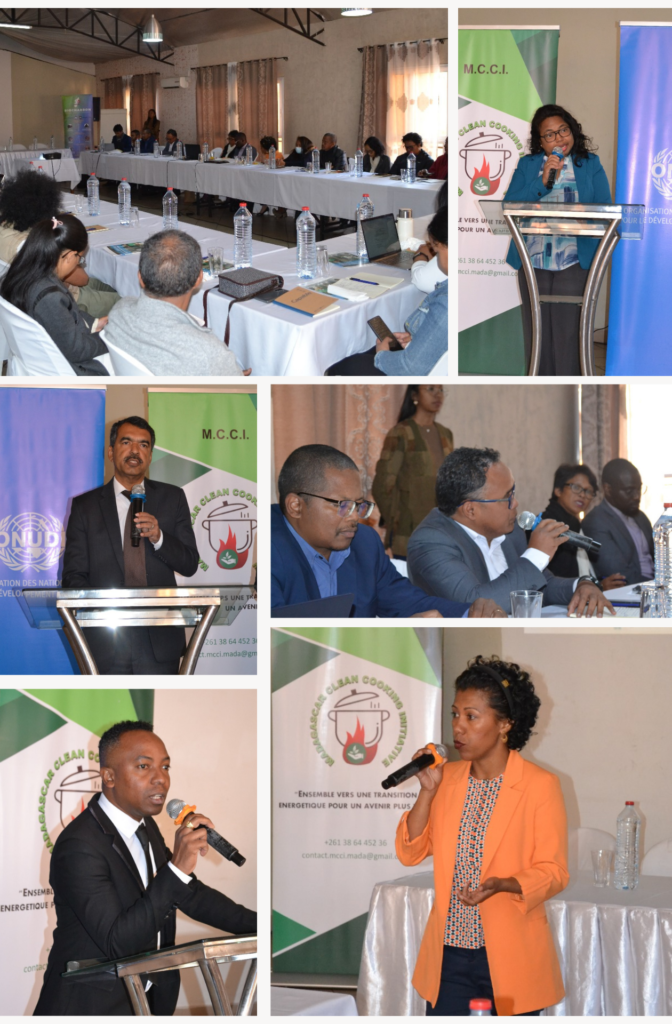Madagascar Clean Cooking Initiative: Towards Just Energy Transition in Madagascar
The United Nations Industrial Development Organization (UNIDO) organized a two-day workshop focused on developing the strategic plan newly formed association of SMEs and Entrepreneurs into clean cooking – Madagascar Clean Cooking Initiative (MCCI). The workshop took place from July 8 to 9, in Antananarivo, Madagascar. The MCCI has an objective to promote a minimum of Tier-2 clean cooking solutions and currently has 38 industry members across 11 regions of Madagascar and chaired by Ms. Marie-Louise Schmidt Rasoamanahirana.
With a vision centered on energy transition, MCCI is committed to promoting the widespread adoption of clean cooking solutions. Their primary objective is to develop and advocate for clean cooking solutions with a minimum Tier 2 rating in Madagascar, aiming to reduce deforestation, enhance public health, and boost the local economy.
MCCI is ready to accelerate this energy transition through clean cooking solutions. However, to achieve their goals, they require support from the public sector, technical and financial partners. The clean cooking sector holds significant potential for economic growth and deserves a central place in Madagascar’s energy landscape. Beyond environmental benefits, MCCI also focuses on social inclusiveness by fostering local employment by creating sustainable economic opportunities.

Through close collaboration with all stakeholders, MCCI strives to ensure that clean cooking technologies become accessible and affordable for all Malagasy households. With concerted efforts, the clean cooking sector can drive substantial advancements in energy efficiency, health improvements, and environmental conservation in Madagascar.
MCCI is an initiative of the Ministry of Energy and Hydrocarbons (MEH), the Ministry of Environment and Sustainable Development (MEDD), and UNIDO, aimed to advance SDG13 (Climate Action) and SDG 7, especially universal access to affordable, reliable, sustainable, and modern clean cooking fuels and technologies.
The workshop gathered a diverse group of stakeholders from the renewable energy sector. Key officials Mr. Thierry Andriantsoa, General Secretary and Mr. Sambatra Ramiandrasson, General Director from the Ministry of Energy and Hydrocarbons (MEH), the Ministry of Environment and Sustainable Development (MEDD), and several other stakeholders including private sector participated in the event. During the official opening, government representatives outlined Madagascar’s ambitious plans for development of clean cooking sector.

Kenny Marco Louis Fidiarison, Director of Energy Production Development from Biological Ingredients (DPEBIO), highlighted the goal of raising the rate of clean cooking usage from 1% to 20.1% by 2030. He emphasized that this target is part of a broader public-private partnership (3P) strategy, which is crucial to achieving sustainable development goals.
The resolutions and strategic plan from the workshop are set to be submitted to the Government Council, aiming to translate the outcome of the workshop into concrete actions. This initiative underscores the importance of modern, nature-based cooking methods, which promise significant improvements in public health and environmental preservation. Modern clean cooking solutions are crucial for reducing indoor air pollution, a major health hazard linked to respiratory illnesses and premature deaths. Additionally, these solutions help mitigate deforestation and greenhouse gas emissions, contributing to environmental conservation.
Adopting clean cooking methods also brings significant economic and social benefits. It reduces the time and money spent on fuel collection and purchasing, enabling families to engage in more productive activities. Moreover, it enhances safety, particularly for women and children who are often responsible for gathering fuel and cooking, reducing the risk of burns and other injuries.
The workshop highlighted the short-term goal to transition to a minimum of Tier-2 clean cooking solutions using improved biomass stoves, other various clean cooking solutions, LPG (liquefied petroleum gas) stoves and electric stoves, biogas, bioethanol where it is affordable and available. These solutions are essential for making cooking safer, more efficient, and environmentally friendly.
Overall, the clean cooking workshop in Antananarivo marks a significant step forward in Madagascar’s journey towards universal access to clean cooking. By placing renewable energies at the heart of national strategies, the country is ready to make substantial progress in public health, environmental protection, and economic development.


